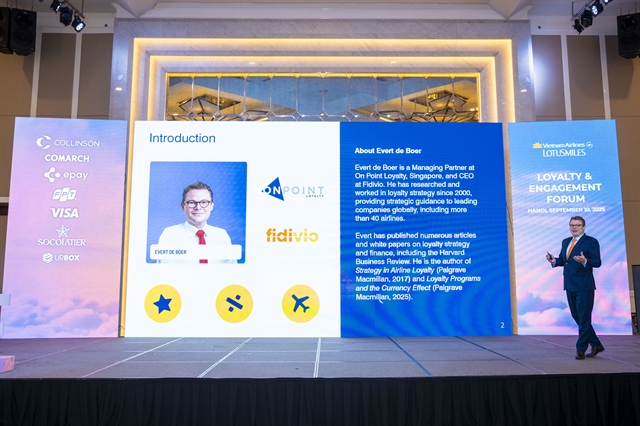In Việt Nam, where the market is dynamic and highly competitive, loyalty programmes are increasingly seen as a strategic tool to strengthen long-term customer relationships, enhance loyalty and optimise revenue.

HÀ NỘI — In the fiercely competitive aviation industry, loyalty programmes have become more than just perks — they are now vital engines driving sustainable growth for airlines worldwide.
In Việt Nam’s dynamic and fast-evolving market, loyalty schemes are increasingly recognised as strategic tools to build long-term customer relationships, boost loyalty and optimise revenue.
At last week’s 'Loyalty Engagement Forum 2025' hosted by Vietnam Airlines in Hà Nội, Evert de Boer, Managing Partner of On Point Loyalty (Singapore), highlighted the growing global significance of loyalty programmes.
“Today, around 80 per cent of companies operate loyalty programmes, with hundreds of billions of US dollars in rewards issued every year,” he said. “The accumulated value of loyalty currencies now exceeds that of most reserve currencies worldwide, ranking just behind the US dollar and euro. This reflects the rise of reward points as a special kind of currency in the modern economy.”
De Boer explained that loyalty points not only encourage consumer behaviour but also enable flexible pricing, open new customer channels and serve as tradable financial assets.
“When managed effectively, loyalty points are more than a marketing tool. They become a financial driver, raising enterprise value and expanding opportunities for global partnerships,” he said.
“I hope businesses will see that operating a successful loyalty system is not merely a marketing initiative – it truly unlocks a new world of possibilities and expands the toolkit companies have to serve their customers.”
In the airline industry, where operating costs are high and passengers enjoy wide choice, loyalty programmes serve not only to build lasting customer connections but also to maximise profits and improve service quality. Despite regional differences, consumer behaviour shows a common preference: customers want to earn points for the services they use and redeem them for travel.
Citing global examples, de Boer highlighted that loyalty contributes as much as 60 per cent of Delta Air Lines’ profits. Other SkyTeam alliance members also consider loyalty a central pillar in attracting and retaining customers.
He emphasised that Việt Nam, with its fast-growing aviation sector, is a promising market for developing loyalty programmes.
“Consumers here increasingly prefer to accumulate reward points and redeem them for trips to destinations such as Paris, New York or Singapore. Việt Nam is a growing market with strong potential for building lasting customer relationships. Loyalty programmes are a powerful tool to create such bonds and reduce the need for fare discounts,” he said.
Lessons from global success stories
According to de Boer, successful loyalty management combines two factors. First, programmes must optimise member engagement by motivating customers with attractive value propositions such as increased spending driven by loyalty benefits. Second, they must carefully manage the loyalty 'currency' itself, maximising the financial value it can generate.
Airlines worldwide are expanding ways to earn miles beyond flights by partnering with external businesses, making programmes appealing even to less frequent travellers. At the same time, reward structures are being fine-tuned to align benefits more closely with the value members bring. These innovations are boosting the economics of loyalty schemes.
Qantas Airways provides one of the most compelling examples. Its loyalty programme has attracted 15 million members — half of Australia’s population. This success shows the extraordinary appeal of Qantas’ model, which extends far beyond flights.
Through a wide partner ecosystem, customers can collect Qantas Points while shopping, banking or using everyday services. This creates additional value for members and encourages greater use of Qantas products. The airline has also partnered with British Airways, Qatar Airways and Aer Lingus, allowing members to benefit from a shared loyalty currency and expanding redemption options.
Such examples, de Boer noted, provide valuable lessons for Vietnamese airlines. By learning from successful global models, local carriers can improve service quality and better meet the expectations of today’s travellers.
Vietnam Airlines takes the lead
Although loyalty programmes in Việt Nam have not yet reached the same scale as in many other countries, the potential is clear. De Boer stressed that Vietnamese airlines should focus on building loyalty systems not only to attract customers but also to create diverse service ecosystems.
Among local carriers, Vietnam Airlines’ LotuSmiles is seen as a pioneer, with nearly seven million members and a rich partner network. LotuSmiles offers members not only global aviation privileges but also benefits in banking, hospitality and retail. Points can be accumulated and spent as a form of 'currency' in daily life — from shopping transactions to unique travel experiences — under the philosophy 'Earn Everywhere, Redeem Anywhere.'
“The most important lesson from successful international models lies in the convenience and flexibility of the currency itself,” de Boer said. “In other words, a programme succeeds when the loyalty currency is easy to earn and provides access to attractive rewards. Consumers ultimately seek value and convenience — and that is what will deliver long-term profitability.” — VNS





